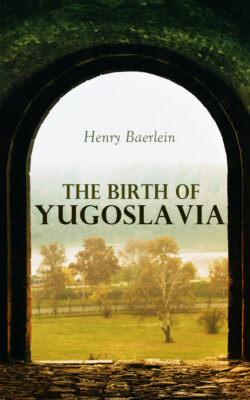Читать книгу The Birth of Yugoslavia - Henry Baerlein - Страница 65
На сайте Литреса книга снята с продажи.
THE MAGYARS AND CROATIA'S PORT
ОглавлениеWith the General and the Ban there is the Bishop, Joseph George Strossmayer, one of the greatest men of the nineteenth century. But before he became Bishop of Djakovo he saw the Government suppress those aspirations which he laboured for throughout his life. The Austrian Government had presented Gaj, in recognition of his literary work, with a diamond ring; but when they saw that his Illyrian programme persisted in aiming at the union of Croatia and Dalmatia, then at last they vetoed his Illyrianism and the word Illyria. His friends thereupon called themselves the "National party," which was in the Croatian Diet more numerous than the "Magyarones," who—many of them unprogressive landlords—stood for the most absolute union with Hungary. The National party demanded that Rieka, which was still "separatum sacræ regni Hungariæ adnexum corpus," should be united with the rest of Croatia; but the Magyars would naturally not let their one small port be taken from them. Those among the Magyars who consented to discuss the matter with the Croats said that if indeed they had purloined one Croat port (for they confessed that 350 kilometres separate Rieka from the nearest place in Hungary), yet the Croatians could afford to treat them with generosity, since they possessed at least two other ports, Bakar and Zengg, that were every bit as good. It was quite true that till Rieka was connected by the railway to the valleys of the Save, the Drave and the Danube, she had no advantage over Zengg and Bakar. None of these are natural ports: at Rieka there is no protecting island, Zengg and Bakar are available for small ships only, and behind all three there is a barrier of mountains. All of them, moreover, suffer from the visitations of the bora, which blows from the north sometimes for weeks on end. Having pointed out their own necessities and all these limitations, the Magyars stayed at Rieka. But they cast about them for some means by which the inconvenient Croats could be countered, and of course the simplest plan was to protect, as Austria was doing in Dalmatia, that small party of the Slavs on whom the presence of a few Italians at Rieka and their knowledge of this language and perhaps their education at some school in Italy had made such a profound impression that they wished no longer to be looked upon as Slavs—and some of them quite honestly thought that they were not Slavs. Of such was the Autonomist party, whose sole purpose was to flourish at Rieka in alliance with Hungarians and to keep Rieka a free Hungarian town. Perhaps the Magyars had no choice of methods, but it does not look magnanimous to plant yourself in some one else's house and then proceed to make conspiracies with a disgruntled child. They succoured the Autonomists in every way. For instance, the Croats had, as elsewhere on the coast, been so unjustly kept from having schools. The two or three schools in existence were for those who turned their back on national ambitions and cultivated modern Italian, even as the nobles up at Zagreb had cultivated Latin. Now in 1838 the Croats of Rieka, who—it is needless to say—were much the more numerous part of the population, thought that Gaj's wonderful educational movement, which was spreading far and wide, should not find Rieka unresponsive. So they asked that the Croatian language should be taught, as well as the Italian, in the local schools. "This was the first attempt," says Mr. Edoardo Susmel,[41] who is, I gather, a schoolmaster or an ex-schoolmaster at Rieka. "But the people of Rieka," he says, "always with admirable tenacity resisted the brute force with which the Croats wanted to impose on the Italian city the rights of him who is strongest. The city arose as one man against this first attack and the schools remained Italian."
The conflict in the Croatian Diet between the National party and that of the Magyarones grew in violence. The latter, egged on from Buda-Pest, demanded in the most peremptory fashion that the Croat deputies should henceforward speak in Magyar instead of Latin. It was in the same year, 1843, that one of the deputies, Ivan Kukulejević, made the first speech in Croatian. Szemere, a Magyar, cried out furiously that Croatia was a land which had been conquered by force of arms, and the Hungarian Parliament went so far as to pass a law which made the teaching of Magyar obligatory in Croatian schools and for the Croatian delegates in the Hungarian Diet. The Croats replied by petitioning the Emperor to separate their country completely from Hungary. Ferdinand V. wavered between the two sides; in 1843 he annulled the decisions of the Hungarian Parliament, and in 1844 he laid it down that in six years the Croats would have to adopt Magyar as their official language. It seemed as if the questions between Magyar and Croat could be settled by no other method than by war.
